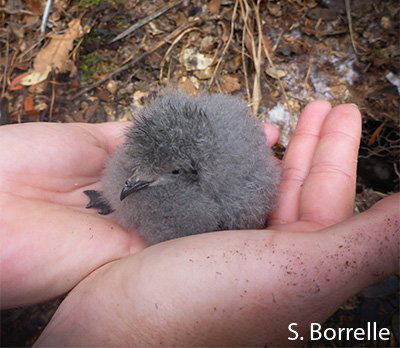New paper - Seabird recovery following predator eradications on islands
25 Jan 2017 Philipp Boersch-Supan seabirds papers Tweet this!Protecting seabirds is a global conservation priority given that 29% of seabird species are threatened with extinction. One of the most acute threats to seabirds is the presence of introduced predators, which depredate seabirds at all life stages, from eggs to adults. Consequently, eradication of invasive predators has been identified as an effective and commonly used approach to seabird conservation.

New Zealand storm petrels are among the species impacted by invasive predators. Photo: S. Borrelle
Millions of dollars are spent on removing predators from offshore islands in the aim of protecting seabirds and island biodiversity. However, post-eradication monitoring is limited, so our understanding of how and if seabirds and their island habitats recover is also limited.
Our new paper, lead by Stephanie Borrelle from the Institute for Applied Ecology New Zealand, investigated the recovery of seabirds to islands in the Hauraki Gulf, New Zealand to try and contribute to understanding these recovery processes better. We found that on islands cleared of predators seabirds recover over time, and such islands have more diverse seabird assemblages than islands that never had predators. Recovery appears to be influenced by a suite of site- and species-specific factors. Managers may assume that given enough time following eradication of predators, seabirds will recolonize an island. Although time is a factor, proximity to source populations and human activities has a significant effect on recolonization by seabirds, as do demographic traits, colonizing ability and habitat suitability.
The paper was published online in the conservation journal Oryx. A free preprint is available here.
Borrelle, S. B., Boersch-Supan, P. H., Gaskin, C. P., & Towns, D. R. (2016). Influences on recovery of seabirds on islands where invasive predators have been eradicated, with a focus on Procellariiformes. Oryx, doi:10.1017/S0030605316000880.